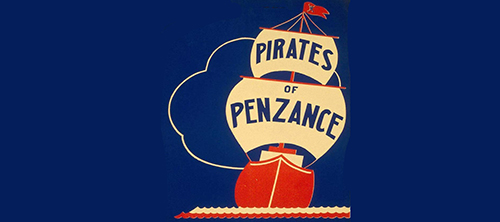
Après le succès sensationnel de "HMS Pinafore", de nombreuses compagnies de spectacle américaines avaient présenté des versions non autorisées de cet opéra. Gilbert, Sullivan et Carte ont décidé d'éviter que cela ne se reproduiseavec leur nouvelle création, "Les Pirates de Penzance", en en présentant les versions officielles simultanément en Angleterre et en Amérique. L'opéra fut créé le 31 décembre 1879 au Fifth Avenue Theatre à New York sous la direction de Sullivan, mais une seule représentation avait été donnée la veille au Royal Bijou Theatre, Paignton, Angleterre, pour garantir le droit d'auteur britannique. Enfin, l'opéra a ouvert ses portes le 3 avril 1880, à l'Opéra Comique de Londres, où il s'est joué pour 363 représentations, ayant connu un succès parallèle pendant plus de trois mois à New York.
Frederic, who, having completed his 21st year, is released from his apprenticeship to a band of tender-hearted pirates. He meets Mabel, the daughter of Major-General Stanley, and the two young people fall instantly in love. Frederic finds out, however, that he was born on 29 February, and so, technically, he only has a birthday each leap year. His apprenticeship indentures state that he remains apprenticed to the pirates until his 21st birthday, and so he must serve for another 63 years.[2] Bound by his own sense of duty, Frederic's only solace is that Mabel agrees to wait for him faithfully
The Pirates of Penzance was the only Gilbert and Sullivan opera to have its official premiere in the United States. At the time, American law offered no copyright protection to foreigners. After their previous opera, H.M.S. Pinafore, was a hit in London, over a hundred American companies quickly mounted unauthorised productions, often taking considerable liberties with the text and paying no royalties to the creators. Gilbert and Sullivan hoped to forestall further "copyright piracy" by mounting the first production of their next opera in America, before others could copy it, and by delaying publication of the score and libretto. They succeeded in keeping for themselves the direct profits of the first production of the opera by opening the production themselves on Broadway, prior to the London production. They also operated U.S. touring companies. However, Gilbert, Sullivan, and their producer, Richard D'Oyly Carte, failed in their efforts over the next decade to control the American performance copyrights over their operas.
Genesis
After the success of Pinafore, Gilbert was eager to get started on the next opera, and he began working on the libretto in December 1878. He re-used several elements of his 1870 one-act piece, Our Island Home, which had introduced a pirate "chief", Captain Bang. Bang was mistakenly apprenticed to a pirate band as a child by his deaf nursemaid. Also, Bang, like Frederic, had never seen a woman before and was affected by a keen sense of duty, as an apprenticed pirate, until the passage of his twenty-first birthday freed him from his articles of indenture.[7] George Bernard Shaw wrote that Gilbert, who had earlier adapted Offenbach's Les brigands, drew on that work also for his new libretto. Gilbert and Sullivan also inserted into Act II an idea they first considered for a one-act opera parody in 1876 about burglars meeting police, and their conflict escaping the notice of the father of a large family of girls. The composition of the music for Pirates was unusual, in that Sullivan wrote the music for the acts in reverse, intending to bring the completed Act II with him to New York, with Act I existing only in sketches. When he arrived in New York, however, he found that he had left the sketches behind, and he had to reconstruct the first act from memory.
Gilbert told a correspondent many years later that Sullivan was unable to recall his setting of the entrance of the women's chorus, so they substituted the chorus "Climbing over rocky mountain" from their earlier opera, Thespis. Sullivan's manuscript for Pirates contains pages removed from a Thespis score, with the vocal parts altered from their original context as a four-part chorus. Some scholars (e.g. Tillett and Spencer, 2000) have offered evidence that Gilbert and Sullivan had planned all along to re-use "Climbing over rocky mountain," and perhaps other parts of Thespis, noting that the presence of the unpublished Thespis score in New York, when there were no plans to revive it, might not have been accidental. On 10 December 1879, Sullivan wrote a letter to his mother about the new opera, upon which he was hard at work in New York. "I think it will be a great success, for it is exquisitely funny, and the music is strikingly tuneful and catching."
The work's title is a multi-layered joke. On the one hand, Penzance was a docile seaside resort in 1879, and not the place where one would expect to encounter pirates. On the other hand, the title was also a jab at the theatrical pirates who had staged unlicensed productions of H.M.S. Pinafore in America. To secure British copyright, a D'Oyly Carte touring company gave a perfunctory performance of Pirates the afternoon before the New York premiere, at the Royal Bijou Theatre in Paignton, Devon, organised by Helen Lenoir (who would later marry Richard D'Oyly Carte). The cast, which was performing Pinafore in the evenings in Torquay, travelled to nearby Paignton for the matinee, where they read their parts from scripts carried onto the stage, making do with whatever costumes they had on hand.
Production and aftermath
Pirates opened on 31 December 1879 in New York and was an immediate hit. On 2 January 1880, Sullivan wrote, in another letter to his mother from New York, "The libretto is ingenious, clever, wonderfully funny in parts, and sometimes brilliant in dialogue – beautifully written for music, as is all Gilbert does. ... The music is infinitely superior in every way to the Pinafore – 'tunier' and more developed, of a higher class altogether. I think that in time it will be very popular." Sullivan's prediction was correct. After a strong run in New York and several American tours, Pirates opened in London on 3 April 1880, running for 363 performances there. It remains one of the most popular G&S works. The critics' notices were generally excellent in both New York and London.
The character of Major-General Stanley was widely taken to be a caricature of the popular general Sir Garnet Wolseley. The biographer Michael Ainger, however, doubts that Gilbert intended a caricature of Wolseley, identifying instead General Henry Turner, uncle of Gilbert's wife, as the pattern for the "modern Major-General". Gilbert disliked Turner, who, unlike the progressive Wolseley, was of the old school of officers. Nevertheless, in the original London production, George Grossmith imitated Wolseley's mannerisms and appearance, particularly his large moustache, and the audience recognised the allusion. Wolseley himself, according to his biographer, took no offence at the caricature and sometimes sang "I am the very model of a modern Major-General" for the private amusement of his family and friends.
• Overture (includes "With cat-like tread", "Ah, leave me not to pine", "Pray observe the magnanimity", "When you had left our pirate fold", "Climbing over rocky mountain", and "How beautifully blue the sky")
Act I
• 1. "Pour, oh pour, the pirate sherry" (Samuel and Chorus of Pirates)
• 2. "When Fred'ric was a little lad" (Ruth)
• 3. "Oh, better far to live and die ...I am a pirate king!" (Pirate King and Chorus of Pirates)
• 4. "Oh! false one, you have deceiv'd me" (Frederic and Ruth)
• 5. "Climbing over rocky mountain" (Chorus of Girls)
• 6. "Stop, ladies, pray" (Edith, Kate, Frederic, and Chorus of Girls)
• 7. "Oh, is there not one maiden breast?" (Frederic and Chorus of Girls)
• 8. "Poor wand'ring one" (Mabel and Chorus of Girls)
• 9. "What ought we to do?" (Edith, Kate, and Chorus of Girls)
• 10. "How beautifully blue the sky" (Mabel, Frederic, and Chorus of Girls)
• 11. "Stay, we must not lose our senses" ... "Here's a first-rate opportunity to get married with impunity" (Frederic and Chorus of Girls and Pirates)
• 12. "Hold, monsters" (Mabel, Major-General, Samuel, and Chorus)
• 13. "I am the very model of a modern Major-General" (Major-General and Chorus)
• 14. Finale Act I (Mabel, Kate, Edith, Ruth, Frederic, Samuel, King, Major-General, and Chorus)
o "Oh, men of dark and dismal fate"
o "I’m telling a terrible story"
o "Hail, Poetry"
o "Oh, happy day, with joyous glee"
o "Pray observe the magnanimity"
Act II
• 15. "Oh, dry the glist'ning tear" (Mabel and Chorus of Girls)
• 16. "Then, Frederic, let your escort lion-hearted" (Frederic and Major-General)
• 17. "When the foeman bares his steel" (Mabel, Edith, Sergeant, and Chorus of Policemen and Girls)
• 18. "Now for the pirates' lair!" (Frederic, Ruth, and King)
• 19. "When you had left our pirate fold" ("A paradox") (Ruth, Frederic, and King)
• 20. "Away, away! My heart's on fire!" (Ruth, Frederic, and King)
• 21. "All is prepar'd; your gallant crew await you" (Mabel and Frederic)
• 22. "Stay, Fred'ric, stay" ... "Oh, here is love, and here is truth" (Mabel and Frederic)
• 23. "No, I'll be brave" ... "Though in body and in mind" (Reprise of "When the foeman bares his steel") (Mabel, Sergeant, and Chorus of Police)
• 23a. "Sergeant, approach!" (Mabel, Sergeant of Police, and Chorus of Police)
• 24. "When a felon's not engaged in his employment" (Sergeant and Chorus of Police)
• 25. "A rollicking band of pirates we" (Sergeant and Chorus of Pirates and Police)
• 26. "With cat-like tread, upon our prey we steal" (Samuel and Chorus of Pirates and Police)
• 27. "Hush, hush, not a word!" (Frederic, King, Major-General, and Chorus of Police and Pirates)
• 28. Finale, Act II (Ensemble)
o "Sighing softly to the river"
o "Now what is this, and what is that?"
o "Frederic here! Oh, joy! Oh, rapture!"
o "With base deceit you worked upon our feelings!"
o "You/We triumph now"
o "Away with them, and place them at the bar!"
o "Poor wandering ones!"
Major-General Stanley (comic baritone)
The Pirate King (bass-baritone)
Samuel, his Lieutenant (baritone)
Frederic, the Pirate Apprentice (tenor)
Sergeant of Police (bass)
General Stanley's daughters:
Mabel (soprano)
Edith (mezzo-soprano)
Kate (mezzo-soprano)
Isabel (speaking role)
Ruth, a Piratical Maid of all work (contralto)
Chorus of Pirates, Police and General Stanley's Daughters
Aucun dossier informatif complémentaire concernant Pirates of Penzance (The)
The notices from critics were generally excellent in both New York and London in 1880. In New York, the Herald and the Tribune both dedicated considerable space to their reviews. The Herald took the view that "the new work is in every respect superior to the Pinafore, the text more humorous, the music more elegant and more elaborate." The Tribune called it "a brilliant and complete success", commenting, "The humor of the Pirates is richer, but more recondite. It demands a closer attention to the words [but] there are great stores of wit and drollery ... which will well repay exploration. ... The music is fresh, bright, elegant and merry, and much of it belongs to a higher order of art than the most popular of the tunes of Pinafore." The New York Times also praised the work, writing, "it would be impossible for a confirmed misanthrope to refrain from merriment over it", though the paper doubted if Pirates could repeat the prodigious success of Pinafore.
After the London premiere, the critical consensus, led by the theatrical newspaper The Era, was that the new work marked a distinct advance on Gilbert and Sullivan's earlier works. The Pall Mall Gazette said, "Of Mr. Sullivan's music we must speak in detail on some other occasion. Suffice it for the present to say that in the new style which he has marked out for himself it is the best he has written." The Graphic wrote, "That no composer can meet the requirements of Mr. Gilbert like Mr. Sullivan, and vice versa, is a fact universally admitted. One might fancy that verse and music were of simultaneous growth, so closely and firmly are they interwoven. Away from this consideration, the score of The Pirates of Penzance is one upon which Mr. Sullivan must have bestowed earnest consideration, for independently of its constant flow of melody, it is written throughout for voices and instruments with infinite care, and the issue is a cabinet miniature of exquisitely defined proportions. … That the Pirates is a clear advance upon its precursors, from Trial by Jury to H.M.S. Pinafore, cannot be denied; it contains more variety, marked character, careful workmanship, and is in fact a more finished artistic achievement … a brilliant success."
There were a few dissenting comments: The Manchester Guardian thought both author and composer had drawn on the works of their predecessors: "Mr. Gilbert ... seems to have borrowed an idea from Sheridan's The Critic; Mr. Sullivan's music is sprightly, tuneful and full of 'go', although it is certainly lacking in originality." The Sporting Times noted, "It doesn't appear to have struck any of the critics yet that the central idea in The Pirates of Penzance is taken from Our Island Home, which was played by the German Reeds some ten years ago." The Times thought Gilbert's wit outran his dramatic invention, and Sullivan's music was not quite as good as that of The Sorcerer, which the Times critic called a masterpiece.
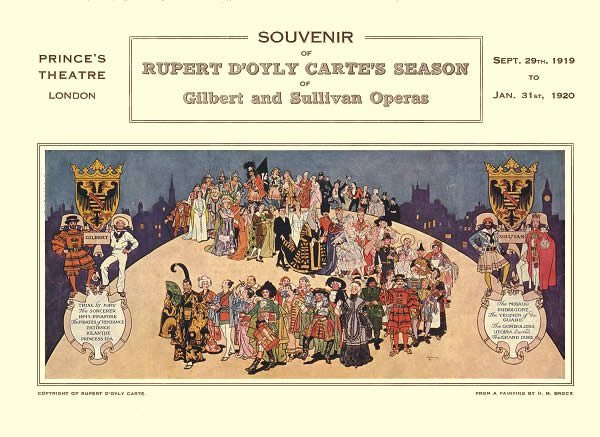
Version 1
Pirates of Penzance (The) (1919-09-Prince's Theatre-London) G&S Season
Type de série: RevivalThéâtre: Shaftesbury Theatre (Londres - Angleterre) Durée : 4 mois Nombre : Première Preview : lundi 29 septembre 1919Première : lundi 29 septembre 1919Dernière : samedi 31 janvier 1920Mise en scène : Chorégraphie : Producteur : D'Oyly Carte Opera Company • Presse : "L'admirable compagnie se distingue par l'inclusion d'un nouveau ténor, M. Derek Oldham, dont la présence et les manières agréables, les capacités d'acteur et la voix exquise ravissent autant que celles de n'importe quel Marco que j'ai vu et entendu. Le duc de M. Henry Lytton, le Don Alhambra de M. Leo Sheffield et la duchesse de Miss Bertha Lewis sont tous en accord avec les traditions du pays, tandis que Miss Elsie Griffin et Miss Nellie Briercliffe formaient un couple d'épouses satisfaisant. L'enthousiasme du public était sans limite." - London Sunday Times
"Après quatre années de guerre et les misères qui en découlent, que se soucie le public britannique d'un inconvénient aussi insignifiant qu'une simple grève des chemins de fer ? Certainement pas assez pour se permettre d'être tenu à l'écart d'un événement aussi primordial que la reprise de Gilbert et Sullivan au Prince's Theatre, où un public immense était venu accueillir l'excellente compagnie de M. D'Oyly Carte lors de sa première visite au centre de Londres. C'était un public brillant et il comprenait non seulement de nombreuses personnalités sociales, théâtrales et musicales de l'époque, mais aussi un certain nombre de ces vieux Savoyards aux noms desquels les opéras de Gilbert et de Sullivan doivent toujours être irrévocablement associés. Miss Jessie Bond, Miss Geraldine Ulmar et M. Rutland Barrington étaient tous là." - Daily Telegraph
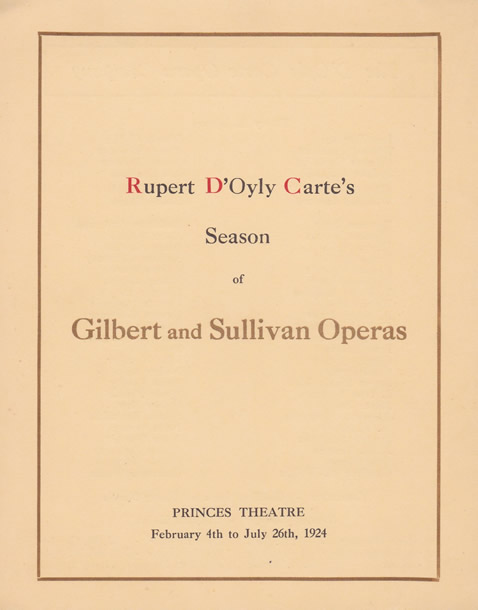
Version 2
Pirates of Penzance (The) (1924-02-Prince's Theatre-London) G&S Season
Type de série: RevivalThéâtre: Shaftesbury Theatre (Londres - Angleterre) Durée : 5 mois 3 semaines Nombre : Première Preview : lundi 04 février 1924Première : lundi 04 février 1924Dernière : samedi 26 juillet 1924Mise en scène : Chorégraphie : Producteur : D'Oyly Carte Opera Company •
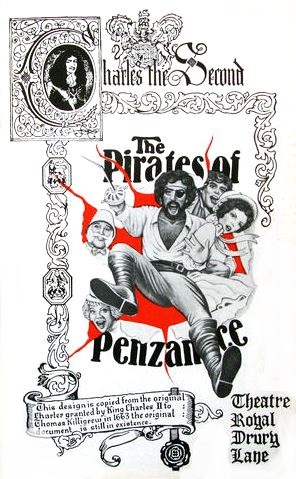
Version 3
Pirates of Penzance (The) (1982-05-Drury Lane Theatre-London)
Type de série: RevivalThéâtre: Drury Lane Theatre (Londres - Angleterre) Durée : 1 an 5 mois Nombre : Première Preview : InconnuPremière : mercredi 26 mai 1982Dernière : samedi 29 octobre 1983Mise en scène : Wilford Leach • Chorégraphie : Graciela Daniele • Producteur : Avec : Tim Curry (Pirate King), Pamela Stephenson (Mabel), George Cole (Major General), Michael Praed (Frederic), Annie Ross (Ruth), Bonnie Langford, Louise GoldCommentaires : This was based on Joseph Papp’s New York Shakespeare Festival Production. It was a completely “new” look at the show - a kind of Broadway version of G&S - and received excellent notices for its exuberance and sheer fun (without straying too far from the original!)
It ran for 17 months, finishing on October 29th, 1983
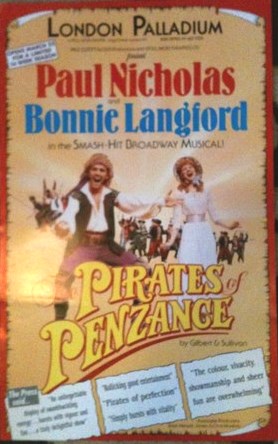
Version 4
Pirates of Penzance (The) (1990-03-Palladium Theatre-London)
Type de série: RevivalThéâtre: Palladium Theatre (Londres - Angleterre) Durée : 3 mois 1 semaine Nombre : 107 représentationsPremière Preview : InconnuPremière : vendredi 23 mars 1990Dernière : samedi 30 juin 1990Mise en scène : Peter Walker • Chorégraphie : Christopher Robinson • Producteur : Avec : Paul Nicholas (Pirate King), Bonnie Langford (Mabel), Frank Thornton (Major General), David Ian (Frederic), Patricia Lancaster (Ruth), Simon BrowneCommentaires : This was based on the production which had played Drury Lane in 1882, and had been re-created for a UK tour. It was booked into the Palladium for a limited 14 week season.

Version 5
Pirates of Penzance (The) (2000-08-Open Air Theatre Regent's Park-London)
Type de série: RevivalThéâtre: Open Air Theatre, Regent's Park (Londres - Angleterre) Durée : 1 mois 1 semaine Nombre : Première Preview : vendredi 28 juillet 2000Première : vendredi 28 juillet 2000Dernière : mardi 05 septembre 2000Mise en scène : Ian Talbot • Chorégraphie : Gillian Gregory • Producteur : Avec : Jimmy Johnston (Pirate King), Lucy Quick (Mabel), Paul Bradley (Major General), Mark Umbers (Frederic), Gay Soper (Ruth), John Owen-Jones, Sara Hillier, Joanne Redman, Fiona Dunn, Stephen MatthewsCommentaires : This was the secon time the Joseph Papp adaptation had been staged in London. It had previously been produced at Drury Lane and the London Palladium.

Version 6
Pirates of Penzance (The) (2001-08-Open Air Theatre Regent's Park-London)
Type de série: RevivalThéâtre: Open Air Theatre, Regent's Park (Londres - Angleterre) Durée : 1 semaine Nombre : Première Preview : lundi 27 août 2001Première : lundi 27 août 2001Dernière : samedi 08 septembre 2001Mise en scène : Ian Talbot • Chorégraphie : Gillian Gregory • Producteur : Avec : Gary Wilmot (Pirate King), Karen Evans (Mabel), David Alder (Major General), Joshua Dallas (Frederic), Su Pollard (Ruth), Giles Taylor, Mark Roper, Sara Hillier, Alison Crowther, Eileen Hunter, Catrin Darnell, Sue O’Brien, Pierre Fabre, Ramin KarimlooCommentaires : This was the same production which had played the 2000 season at the Open Air, but with a new cast, and it had been touring in the mean-time.

Version 7
Pirates of Penzance (The) (2008-02-Gielgud Theatre-London)
Type de série: RevivalThéâtre: Gielgud Theatre (Londres - Angleterre) Durée : 1 semaine Nombre : Première Preview : lundi 18 février 2008Première : lundi 18 février 2008Dernière : samedi 01 mars 2008Mise en scène : Peter Mulloy • Chorégraphie : Producteur : Avec : Barry Clark (Major General), Beverley Klein (Ruth), David Curry (Frederic), Deborah Meyers (Mabel), Jo Brand (Sergeant of Police), Lesley Cox ( Kate), Michael Kerry (Samuel), Sophie-Louise Dann (Edith), Steven Page (Pirate King), Victoria Ward (Isabel)
Pas encore de video disponible pour ce spectacle